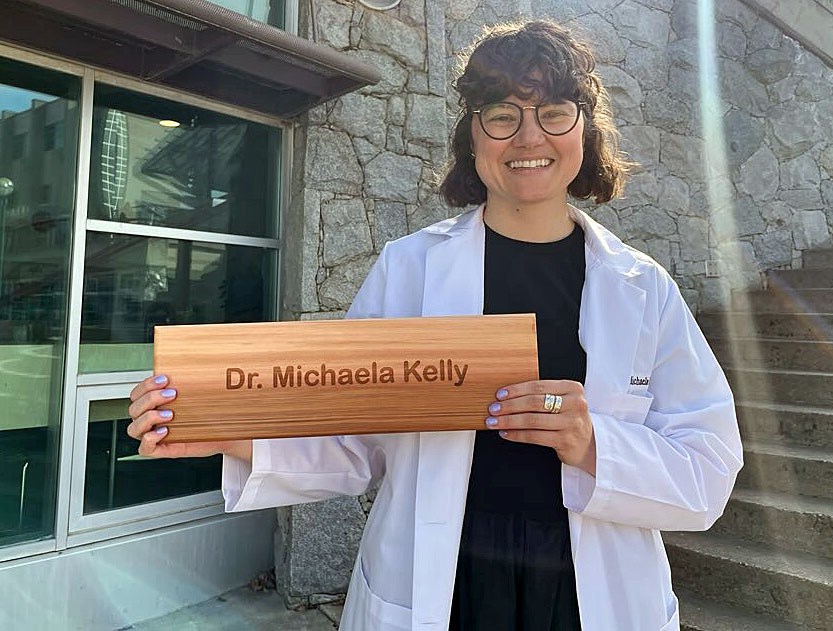Michaela Kelly’s background as a math teacher should serve her well now that she’s a medical doctor.
Her brain is wired to solve problems, crunch numbers, and work out formulas — skills that will undoubtedly come in handy when tracking a patient’s statistics or calculating the correct prescription dosage.
After four years as a student in UBC’s Northern Medical Program (NMP) at UNBC, Thursday marked graduation day, a proud moment for Kelly, her parents from Kamloops, and her partner, who were there at the UNBC Agora to watch the ceremony. Twenty-nine NMP grads, dressed in their white coats, received engraved wooden shingles featuring the abbreviated title “Dr.” next to their names.
“It’s an incredible feeling. I’m just so grateful to have had the opportunity to go through the past four years—and also grateful to be on the other side of it, looking forward to what’s next,” said Kelly. “When we first started, they told us that the days would feel long but the years would feel short, and I think that’s really true.
“I’m still early in my career, and I have a lot more to learn, but I’m really grateful to be in this profession, for sure.”
Kelly started medical school at age 30, after several years of teaching math at an alternative school in Kamloops. Her only prior healthcare experience was working as a doula, helping with childbirth. Now, with her medical license in hand, she’s looking forward to helping bring babies into the world, part of her new role as a family physician in Hazelton.
For the next two years, Kelly will complete her residency in the Rural Immersion Program, which focuses on attracting more doctors to smaller communities in northern BC — places where physicians aren’t confined to just one area of medicine.
“I really love the broad scope that’s possible for rural family doctors,” she said. “You work in emergency, in the clinic, care for in-patients in the hospital, deliver babies — it’s kind of the full spectrum, from newborns to end-of-life care.
“I’ve learned a bit about who I’ll be learning from in Hazelton, and I’m just very excited to have the chance to work with them. In rural immersion residency in particular, you work quite closely with family doctors. In some other family medicine residencies, you also work with specialists, which is great training, but I’m especially excited to dive into working with family physicians.”
Third- and fourth-year NMP students complete clinical assignments at UHNBC or in hospitals across BC. Kelly spent time in Quesnel, an experience that piqued her interest in rural medicine.
“I’m just excited to care for people in some of their most vulnerable moments and to be a supportive presence in their lives. I love being in the hospital in the middle of the night,” she said. "There’s something really special about it."
Her third year of medical school was likely the most challenging.
“Everything is new all the time,” Kelly said. “When we started clinical work in third year, every couple of weeks you’re starting a new job, and everything is new all day. It’s really exciting but also really tiring, doing new stuff all day long.”
This year’s class marks the 18th cohort of graduates since the Northern Medical Program’s first in 2008. All members of the Class of 2025 have secured placements to begin working as doctors. Sixteen (55 per cent) are entering family medicine residencies, and 13 plan to become specialists. Three NMP students who haven’t yet completed the program are expected to graduate later this year.
“At least five will be staying in the North,” said Dr. Paul Winwood, regional associate dean for Northern BC with UBC’s Faculty of Medicine. “But you have to appreciate that opportunities for residency training are limited in northern BC, because many types of residencies just aren’t available here, and the number of seats is quite small.”
“In family medicine, they’re still learners working under supervision, but they’re now practicing as licensed physicians. Typically, they’ll spend time in hospitals, extending their knowledge and learning about the fundamentals of health care across various specialties.”
“They’ll also spend time throughout their residency working alongside experienced family doctors. Many will do an additional year, depending on their interests and the needs of the communities they want to serve.”
As of the 2023-24 intake, the province expanded NMP capacity from 32 to 40 seats. B.C.’s total annual intake, including students at UNBC, UBC, and UBC Okanagan, was increased from 288 to 328.
Since the first NMP graduating class, nearly 30 per cent of grads have settled into long-term practice in northern B.C. or the Yukon. Another 65 per cent are working in smaller cities or rural communities. Most specialist-based training positions are not available in the North, and with 45 per cent of NMP grads, on average, pursuing specialties, many end up training — and often staying — elsewhere.
However, since 2008, 27 NMP grads who completed specialist training elsewhere have returned to work in northern BC, and Winwood noted that four or five return each year.
This year’s 13 aspiring specialists have secured placements in emergency medicine, internal medicine, psychiatry, radiation oncology, anesthesia, obstetrics and gynecology, and neurology.
“It’s a pretty broad spread, and we’re quite proud of that,” said Winwood. “Our grads over the years have gone into just about every specialty imaginable, and we’ve really covered the full range.”
“You have to remember that there aren’t many specialist positions in the North, and specialist training can take up to seven years after graduation.”



